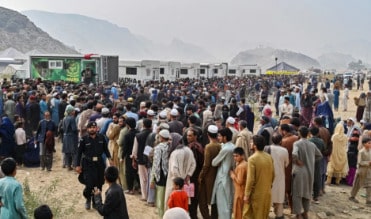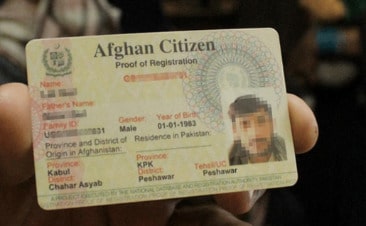Pakistan has announced its intention to expel about 600,000 Afghan citizens, an official confirmed through media reports. The deportation drive, which will begin after Eid al-Fitr in April, targets individuals holding Pakistan-issued ID cards for Afghan citizens. The move follows the deportation of nearly half a million unidentified Afghan refugees since last November, amid security concerns and rising terror attacks in the country. The Pakistani government blamed the attack on banned militant groups and accused their leaders of seeking refuge in neighboring Afghanistan.
Furthermore, according to the administration, Afghan nationals have committed violent crimes against Pakistani people and security personnel. During a briefing to private online media Fazale Rabi, the Commissionerate for Afghan Refugees’ director of Repatriation, said that the second part of the expulsion operation will begin next month. Reiterating that these refugees’ identity cards were provided between 2017 and 2018 to register refugees as legal migrants, he emphasized the cooperative efforts of the four provinces and the federal government in formulating a plan to remove Afghan Citizen Card-holders. The next round of expulsions could target those bearing ID cards that store biometrics.
Expulsion campaign
The Afghan nationals who were not registered were the main target of the expulsion drive, which got underway in November 2023, through which 0.4 million illegal refugees were already deported. But the second phase, which is scheduled to start after Eid Al-Fitr, will concentrate on people with Afghan Citizen Cards (ACC) issued by Pakistan. According to Arab news, government representatives claim that peace and stability are returning to Afghanistan after decades of U.S.-Afghan war, so Afghan nationals should go back to rebuild and reconstruct their country. They hope the process will reduce illegal immigration and address security concerns. Cardholders will be urged to return voluntarily; otherwise, they face arrest and deportation. The government possesses identity data on Afghan citizen cardholders, easing the process of identifying illegal foreigners. Phase three will target Afghan proof of registration (POR) cardholders, who are estimated to number 1.4 million. The initiative was jointly launched in 2006 by the government of Pakistan and UNHCR, and POR cards include refugees’ biometric data.
Afghan biometric registration drive and mapping
About 690,000 Afghan citizens received ACCs during the registration campaign, and are being mapped to determine their current residence. Pakistan hosts 4 million Afghan migrants and 1.7 million unidentified persons who have fled the war since 1979. The first phase of expulsion exempted Afghan nationals with valid documents or PoR cards, recognizing their legal status.
Importance of PoR cards
It is necessary to pay attention to how crucial Proof of Registration (PoR) cards are for Afghan refugees during the expulsion campaign. These cards function as identity documents that permit refugees to live in Pakistan. Nevertheless, they neither grant permission to cross international borders nor immunity from criminal prosecution. The PoR cards must undergo biometric verification by the National Database and Registration Authority (NADRA), for refugees to access basic amenities and services in Pakistan.
The deportation campaign directing Afghan refugees holding Pakistan-issued Afghan citizenship documents emphasizes the country’s efforts to address security concerns and reduce illegal migration. Pakistan intends to accelerate deportations and has pledged to expel undocumented immigrants to Afghanistan through biometric mapping and regular identification procedures. However, the proof of registration (PoR) cards provide proof of identification for Afghan refugees to access ongoing support to stay in Pakistan and access basic necessary services legally.
Aricle: Pakistan to deport 600K afghans with refugee ID cards

